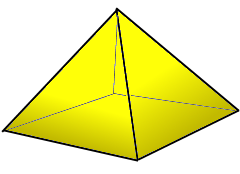Square Pyramid Calculator
Calculator and formulas for a square pyramid (Johnson solid J1)
Square Pyramid Calculator
The Square Pyramid
A square pyramid has a square base with four triangular faces (Johnson solid J₁).
Square Pyramid Properties
The fundamental pyramid: Square base with four equilateral triangular faces
Square Pyramid Structure

Square base with triangular faces.
Johnson solid J₁.
|
|
What is a Square Pyramid?
A square pyramid is the first and most fundamental Johnson solid:
- Definition: Pyramid with square base and triangular faces
- Classification: Johnson solid J₁
- Base: Regular square
- Sides: 4 equilateral triangles
- Uniform edges: All edges equal length
- Ancient form: Known since antiquity
Geometric Properties of the Square Pyramid
The square pyramid showcases fundamental geometric properties:
Basic Parameters
- Faces: 5 faces total (1 square + 4 triangles)
- Edges: 8 edges (all equal)
- Vertices: 5 vertices
- Euler characteristic: V - E + F = 5 - 8 + 5 = 2
Special Properties
- Fundamental form: Simplest pyramid with square base
- Ancient heritage: Known since Egyptian times
- Johnson solid: First of the J₁ family
- Uniform edges: All edges same length
Mathematical Relationships
The square pyramid follows elegant mathematical principles:
Volume Formula
V = (√2/6) × a³ ≈ 0.2357 × a³. Simple and elegant.
Surface Formula
S = (1 + √3) × a² ≈ 2.732 × a². Base plus triangular faces.
Applications of the Square Pyramid
Square pyramids find applications in various fields:
Architecture & Construction
- Pyramid structures and monuments
- Roof designs and spires
- Decorative architectural elements
- Modern building features
Science & Technology
- Crystal structure models
- Molecular geometry
- Engineering components
- 3D printing designs
Education & Teaching
- Basic geometry education
- Johnson solid introduction
- 3D geometry concepts
- Mathematical demonstrations
Art & Design
- Sculptural works
- Architectural ornaments
- Decorative objects
- Geometric art pieces
Square Pyramid Formulas
Volume (V)
Volume with elegant √2/6 coefficient
Surface Area (S)
Surface area: square base + 4 triangular faces
Height (h)
Height with simple √2/2 factor
Base Area (A_base)
Simple square base area
Square Pyramid Parameters
Square (a × a)
4 equilateral triangles
8 equal edges
Johnson J₁
The fundamental pyramid form with square base
Calculation Example for Square Pyramid
Given
Find: All properties of the square pyramid
1. Volume Calculation
For edge length a = 10:
\[V = \frac{\sqrt{2}}{6} \cdot 1000\] \[V \approx 0.2357 \cdot 1000\] \[V \approx 235.7\]The volume is approximately 235.7 cubic units
2. Surface Area Calculation
For edge length a = 10:
\[S = (1 + \sqrt{3}) \cdot 100\] \[S = (1 + 1.732) \cdot 100\] \[S \approx 273.2\]The surface area is approximately 273.2 square units
3. Height Calculation
For edge length a = 10:
\[h = \frac{\sqrt{2}}{2} \cdot 10\] \[h \approx 0.7071 \cdot 10\] \[h \approx 7.07\]The height is approximately 7.07 length units
4. Base Area Calculation
For edge length a = 10:
\[A_{base} = 10^2\] \[A_{base} = 100\]The base area is 100 square units
5. Complete Square Pyramid
The fundamental square pyramid with perfect geometric proportions
The Square Pyramid: Foundation of Geometry
The square pyramid holds a special place in both mathematics and human history as one of the most fundamental and recognizable geometric forms. As Johnson solid J₁, it represents the beginning of the Johnson solid family, embodying the perfect marriage of a square base with four equilateral triangular faces. From the ancient pyramids of Egypt to modern architectural marvels, this shape has captivated humanity for millennia, demonstrating the timeless appeal of geometric perfection and structural integrity.
The Foundation of Pyramidal Geometry
The square pyramid showcases the essence of pyramidal construction:
- Square foundation: Perfect square base provides stable platform
- Triangular faces: Four equilateral triangles meeting at apex
- Uniform edges: All 8 edges have identical length
- Ancient heritage: Known and built since ancient civilizations
- Johnson classification: The very first Johnson solid J₁
- Mathematical elegance: Simple formulas with √2 and √3
- Structural perfection: Optimal load distribution
Historical and Mathematical Significance
Ancient Heritage
The square pyramid is perhaps the most historically significant geometric form, immortalized in the Great Pyramid of Giza and countless other monuments throughout human history, proving its enduring architectural and spiritual significance.
Mathematical Foundation
As the first Johnson solid, it establishes the principles that govern all subsequent Johnson solids: uniform edge lengths, regular faces, and convex form, making it the cornerstone of modern polyhedral geometry.
Structural Excellence
The pyramid form provides exceptional structural stability, efficiently channeling forces to the base while creating a visually striking silhouette that has inspired architects and engineers for thousands of years.
Geometric Simplicity
Despite its profound significance, the square pyramid's formulas are beautifully simple, involving fundamental constants like √2 and √3, demonstrating how basic mathematical relationships can create forms of lasting beauty and utility.
Summary
The square pyramid stands as the fundamental form that bridges ancient wisdom and modern mathematics. As Johnson solid J₁, it represents not just the beginning of a mathematical classification, but the embodiment of humanity's quest for geometric perfection. Its simple yet profound structure - a square base crowned by four triangular faces - demonstrates how basic geometric principles can create forms of extraordinary beauty and utility. From the pyramids of ancient Egypt to contemporary architectural designs, from basic geometry lessons to advanced mathematical studies, the square pyramid continues to serve as a perfect example of how mathematical elegance and practical application can unite in a single, timeless form. Its legacy as both a monument to human achievement and a cornerstone of geometric understanding ensures its continued relevance in mathematics, architecture, and human imagination.
|
|
|
|